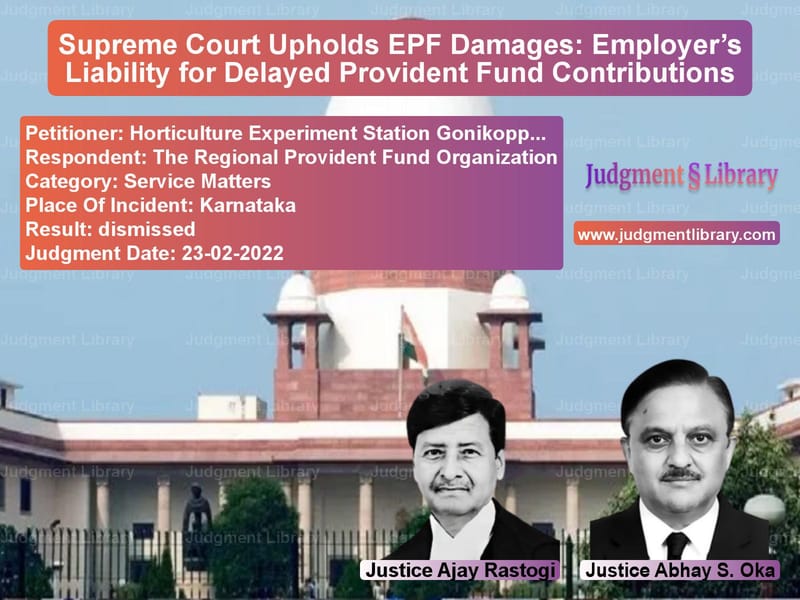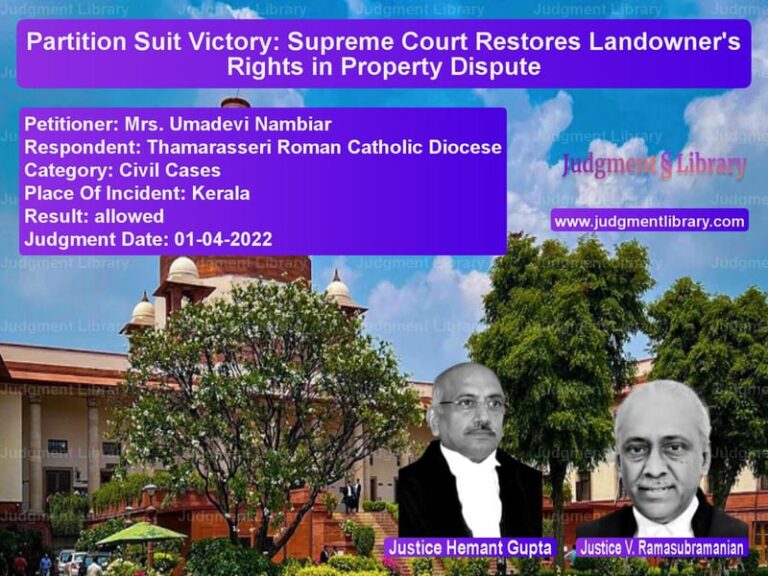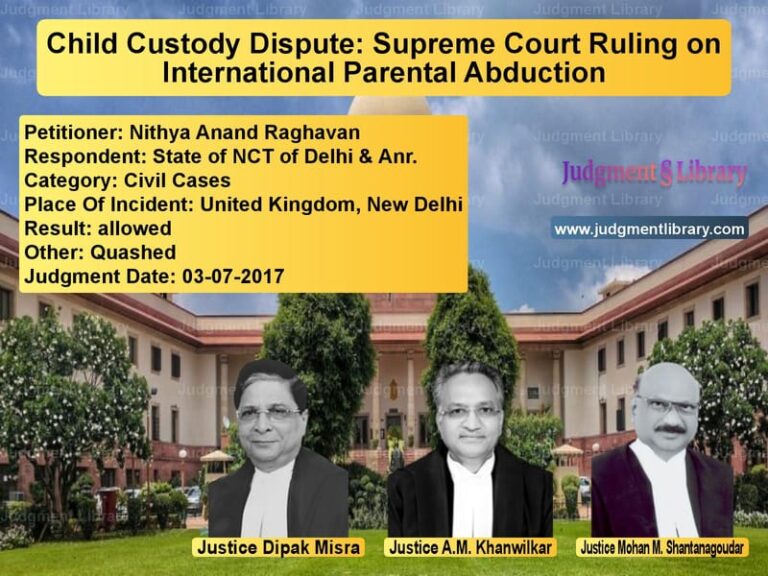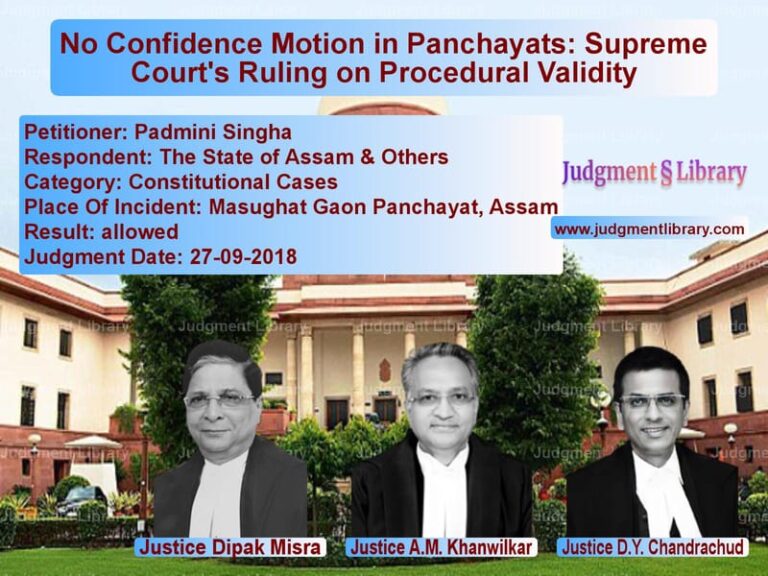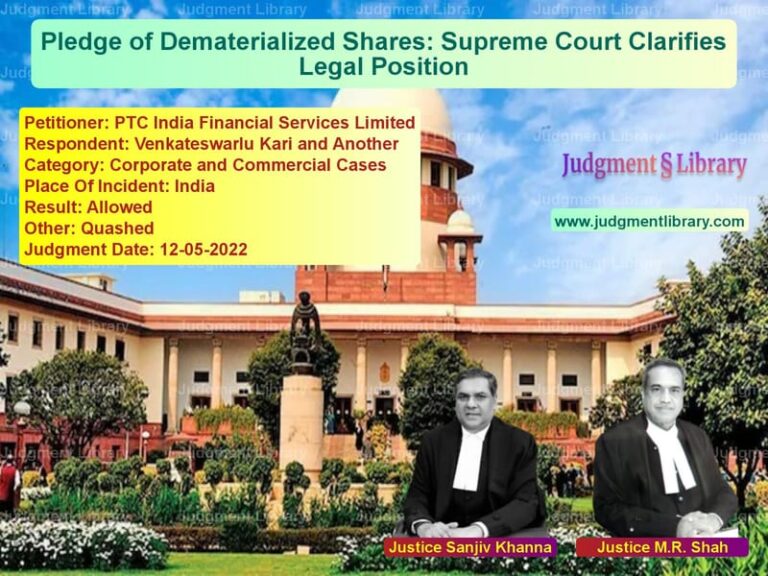Supreme Court Upholds EPF Damages: Employer’s Liability for Delayed Provident Fund Contributions
The Supreme Court, in the case of Horticulture Experiment Station Gonikoppal, Coorg vs. The Regional Provident Fund Organization, ruled on a crucial issue regarding the imposition of damages for delayed provident fund contributions under the Employees Provident Fund and Miscellaneous Provisions Act, 1952 (EPF Act). The case focused on whether employers could be excused from penalties under Section 14B of the Act by arguing lack of intention or financial difficulties.
Background of the Case
The case originated from proceedings initiated by the Regional Provident Fund Organization against the appellant for failing to deposit provident fund contributions from 1 January 1975 to 31 October 1988. The appellant was found liable for arrears amounting to Rs. 74,288, which were later paid. However, a subsequent notice under Section 14B imposed additional damages of Rs. 85,548 for the delay.
The employer challenged this imposition before the Karnataka High Court, which upheld the damages, leading to the present appeal before the Supreme Court.
Arguments by the Parties
Petitioner’s Arguments (Horticulture Experiment Station Gonikoppal, Coorg)
- The employer had financial constraints that prevented timely payment of EPF contributions.
- The imposition of damages was excessive and did not consider the lack of intentional default.
- The element of mens rea (guilty intention) should be considered while determining damages.
- The penalties should be waived or reduced in view of the employer’s financial difficulties.
Respondent’s Arguments (Regional Provident Fund Organization)
- The obligation to deposit EPF contributions was statutory, and failure to comply warranted automatic penalties.
- Section 14B of the EPF Act allowed for the imposition of damages without requiring proof of mens rea.
- Delays in payment caused financial loss to employees, which justified the penalties.
- The employer was provided due process and an opportunity to present reasons for the delay.
Supreme Court’s Key Observations
1. Employer’s Obligation to Deposit EPF Contributions
The Court emphasized that the EPF Act was a social welfare legislation intended to protect employees:
“The employer has a statutory duty to deposit provident fund contributions in a timely manner. Financial difficulties or lack of intention cannot be a ground to avoid statutory liabilities.”
2. No Requirement of Mens Rea for Imposing Damages
The Court clarified that the liability under Section 14B did not require proof of mens rea:
“The imposition of damages for delay in EPF contributions is a civil liability. It is not akin to a criminal penalty where mens rea must be established.”
3. Precedents on EPF Liabilities
The Court referred to previous judgments affirming the strict nature of compliance under the EPF Act:
- In Organo Chemical Industries vs. Union of India, it was held that damages under Section 14B were automatic upon non-compliance.
- In Union of India vs. Dharmendra Textile Processors, the Court ruled that penalty provisions for civil liabilities do not require proof of mens rea.
4. Employer’s Claim of Financial Constraints Rejected
The Court dismissed the argument that financial difficulties justified delayed EPF contributions:
“The financial constraints of an employer cannot override statutory obligations. Employee rights under the EPF Act must be safeguarded.”
Final Judgment
The Supreme Court ruled as follows:
- The appeal by Horticulture Experiment Station Gonikoppal, Coorg was dismissed.
- The Karnataka High Court’s order upholding damages was affirmed.
- The employer was held liable for the imposed damages of Rs. 85,548.
Impact of the Judgment
This ruling has significant implications for employer liabilities under the EPF Act:
- Reaffirms strict compliance: Employers cannot cite financial difficulties as an excuse for delayed EPF contributions.
- Establishes precedent on penalties: Reinforces that damages under Section 14B are mandatory and do not require proof of intention.
- Protects employee benefits: Ensures that employees receive timely provident fund contributions.
- Limits judicial interference: Courts will not reduce damages simply because an employer claims financial hardship.
The Supreme Court’s ruling strengthens the enforcement of provident fund regulations and underscores the importance of ensuring timely contributions to safeguard employee rights.
Petitioner Name: Horticulture Experiment Station Gonikoppal, Coorg.Respondent Name: The Regional Provident Fund Organization.Judgment By: Justice Ajay Rastogi, Justice Abhay S. Oka.Place Of Incident: Karnataka.Judgment Date: 23-02-2022.
Don’t miss out on the full details! Download the complete judgment in PDF format below and gain valuable insights instantly!
Download Judgment: horticulture-experim-vs-the-regional-provide-supreme-court-of-india-judgment-dated-23-02-2022.pdf
Directly Download Judgment: Directly download this Judgment
See all petitions in Pension and Gratuity
See all petitions in Public Sector Employees
See all petitions in Judgment by Ajay Rastogi
See all petitions in Judgment by Abhay S. Oka
See all petitions in dismissed
See all petitions in supreme court of India judgments February 2022
See all petitions in 2022 judgments
See all posts in Service Matters Category
See all allowed petitions in Service Matters Category
See all Dismissed petitions in Service Matters Category
See all partially allowed petitions in Service Matters Category

